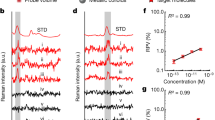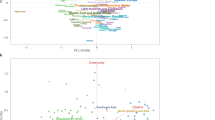Abstract
EVERY time that physics has offered a new analytical tool to chemistry, the most striking success has been the discovery of new elements. Rubidium and csesium are thus offsprings of the use of the spectroscope, polonium and radium were discovered through the new methods of radioactivity, hafnium and rhenium were recognized through their X-ray spectra.
This is a preview of subscription content, access via your institution
Access options
Subscribe to this journal
Receive 51 print issues and online access
$199.00 per year
only $3.90 per issue
Buy this article
- Purchase on Springer Link
- Instant access to full article PDF
Prices may be subject to local taxes which are calculated during checkout
Similar content being viewed by others
References
See, however, Noddack, W., and Tacke, I., Sitzb. Preuss. Akad. der Wissenschaften, 19, 400 (1925).
Perrier, C., and Segré, E., J. Chem. Phys., 5, 712 (1937); and in the Press.
Cacciapuoti, B., and Segrè, E., Phys. Rev., 52, 1252 (1937); and unpublished results.
Segrè, E., Seaborg, G. T., Phys. Rev., 54, 772 (1938).
Abelson, P., unpublished results
Rights and permissions
About this article
Cite this article
SEGRÉ, E. Element 43. Nature 143, 460–461 (1939). https://doi.org/10.1038/143460a0
Issue Date:
DOI: https://doi.org/10.1038/143460a0
This article is cited by
-
Die Geschichte der Entdeckung k�nstlicher Elemente
Die Naturwissenschaften (1964)
Comments
By submitting a comment you agree to abide by our Terms and Community Guidelines. If you find something abusive or that does not comply with our terms or guidelines please flag it as inappropriate.



